Key takeaways:
- Military chaplaincy is vital for providing spiritual support and fostering unity among service members of diverse backgrounds in challenging environments.
- Hospital ministry emphasizes the importance of compassionate presence, community connection, and holistic healing that combines emotional and spiritual care with medical treatment.
- Key roles of military chaplains include offering counsel, facilitating rituals, and intervening during crises, highlighting their presence during moments of profound stress and grief.
- Future goals for military chaplaincy include enhancing mental health resources, supporting families of deployed personnel, and promoting interfaith dialogue within the military community.
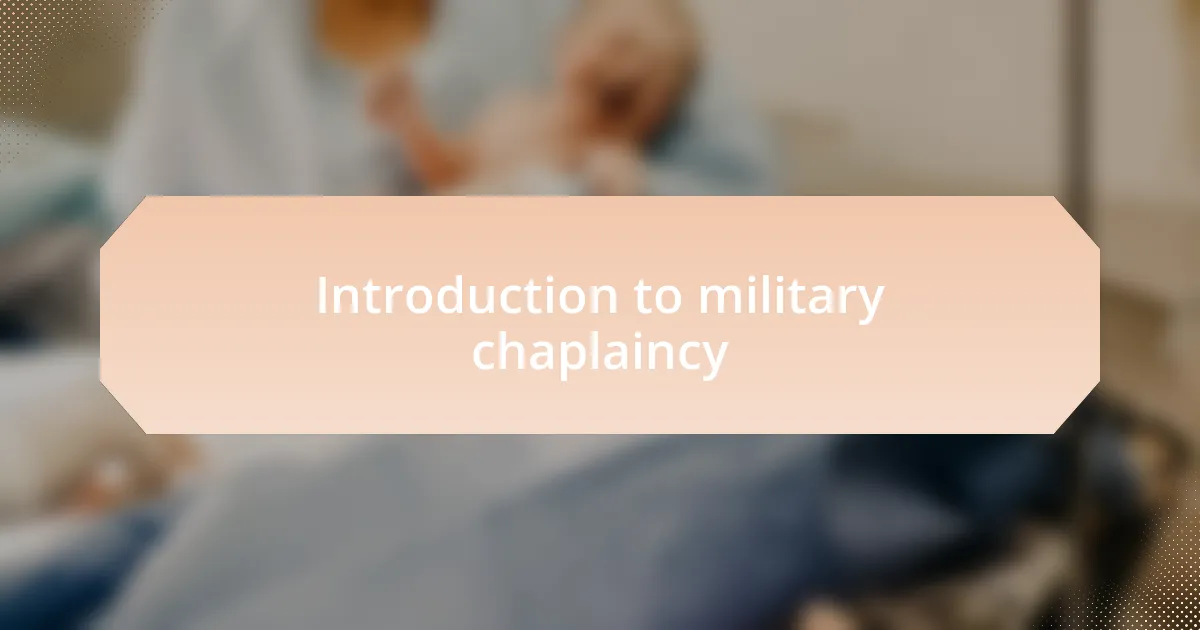
Introduction to military chaplaincy
Military chaplaincy serves as a unique and vital ministry within the armed forces, providing spiritual support to service members and their families in challenging environments. I often reflect on the intensity of those moments when a soldier needs guidance, perhaps during a late-night call or after a particularly harrowing day. How can one truly convey comfort in such a high-stakes setting?
What strikes me most about chaplaincy is its ability to transcend differences—religious or otherwise. I recall a moment when I helped facilitate a multi-faith service, bringing together individuals from diverse backgrounds. This experience underscored for me that, at our core, we’re united by shared values of hope and resilience, even amidst the chaos.
The role of a military chaplain is not just about offering prayers; it’s about being present in times of uncertainty. I vividly remember sitting beside a soldier grappling with loss, unsure of how to process their grief. It’s in those quiet, intimate moments that I realize how essential our presence can be, opening a door to healing through listening and understanding.
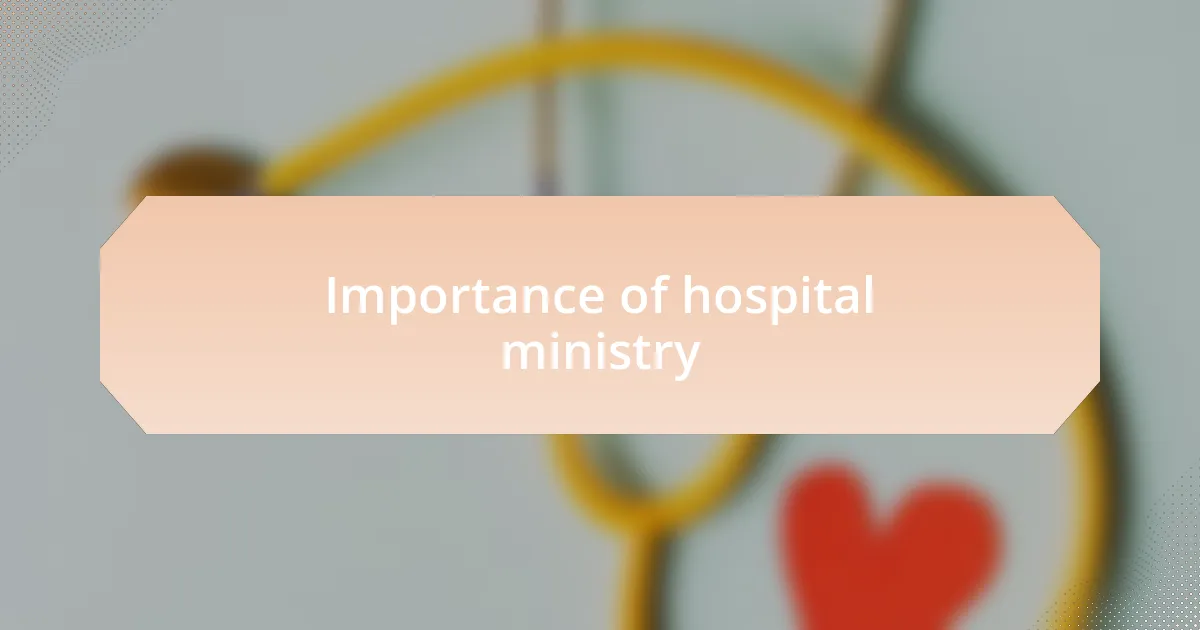
Importance of hospital ministry
Hospital ministry plays a crucial role in providing emotional and spiritual care to patients and their families during some of the most trying times in their lives. I recall a time when I visited a patient who was battling a severe illness. Their eyes lit up when I shared a moment of silence together; it was a simple yet profound reminder that even in physical distress, hope can be restored through compassionate presence.
The importance of hospital ministry also includes fostering a sense of community and connection. One afternoon, I led a small group prayer session in the waiting area, where families gathered for support. Seeing them hold hands and share their fears made me realize how essential it is to create safe spaces where people can find solace and solidarity amidst uncertainty.
Moreover, hospital ministry often serves as a bridge between medical care and spiritual healing. In my experience, I’ve seen healthcare providers appreciate the holistic approach that chaplains bring to patient care. When I collaborated with nurses and doctors to address a family’s emotional needs alongside their medical concerns, it reinforced my belief that healing transcends the physical; it encompasses the heart and spirit as well.
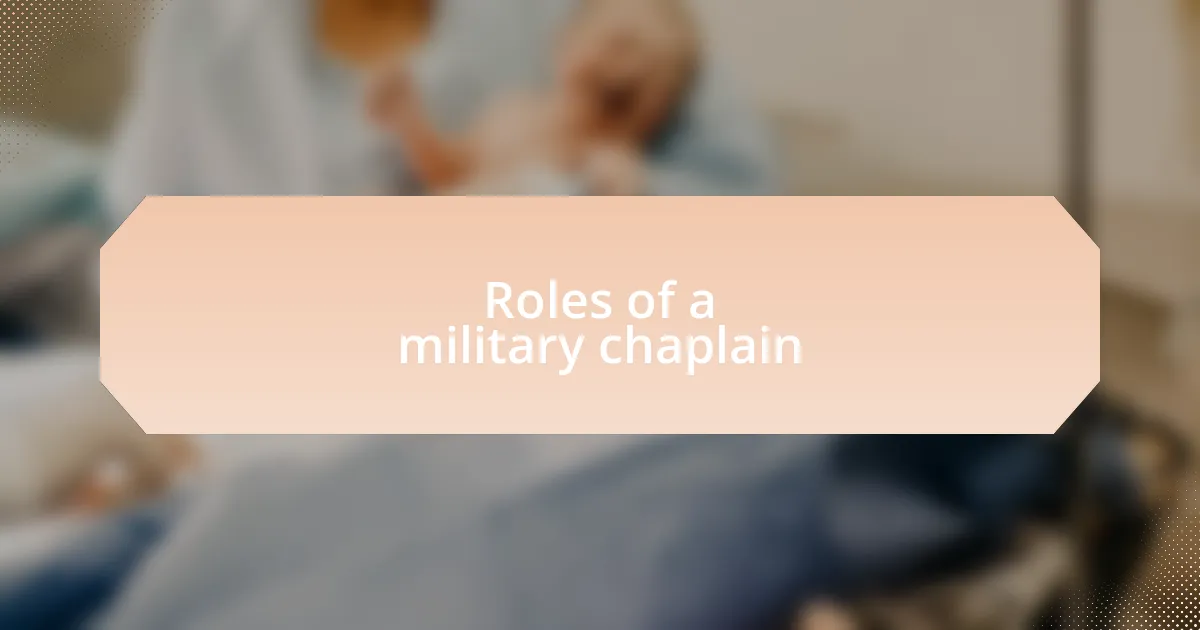
Roles of a military chaplain
Military chaplains wear many hats, as they are both spiritual leaders and sources of comfort. Among their significant roles is providing counsel to service members and their families. I remember sitting with a soldier who was grappling with loneliness during deployment. Sometimes, just listening can make the difference, allowing them to express their fears and find clarity in their thoughts.
Another essential role is facilitating rituals and ceremonies. I have officiated numerous memorial services, each one a poignant reminder of sacrifice and community. These moments serve as powerful opportunities for individuals to come together, process grief, and honor the unique experiences shared among comrades. Isn’t it fascinating how such gatherings can strengthen bonds that often go unspoken?
Chaplains also play a critical part in crisis intervention, stepping in during moments of profound stress or tragedy. Once, during a particularly challenging training exercise, I was called to support troops after an unexpected accident. I provided immediate spiritual and emotional support, which I learned is vital to restoring morale. Reflecting on moments like these, I realize that being a military chaplain truly encompasses standing shoulder to shoulder with others during their darkest hours.
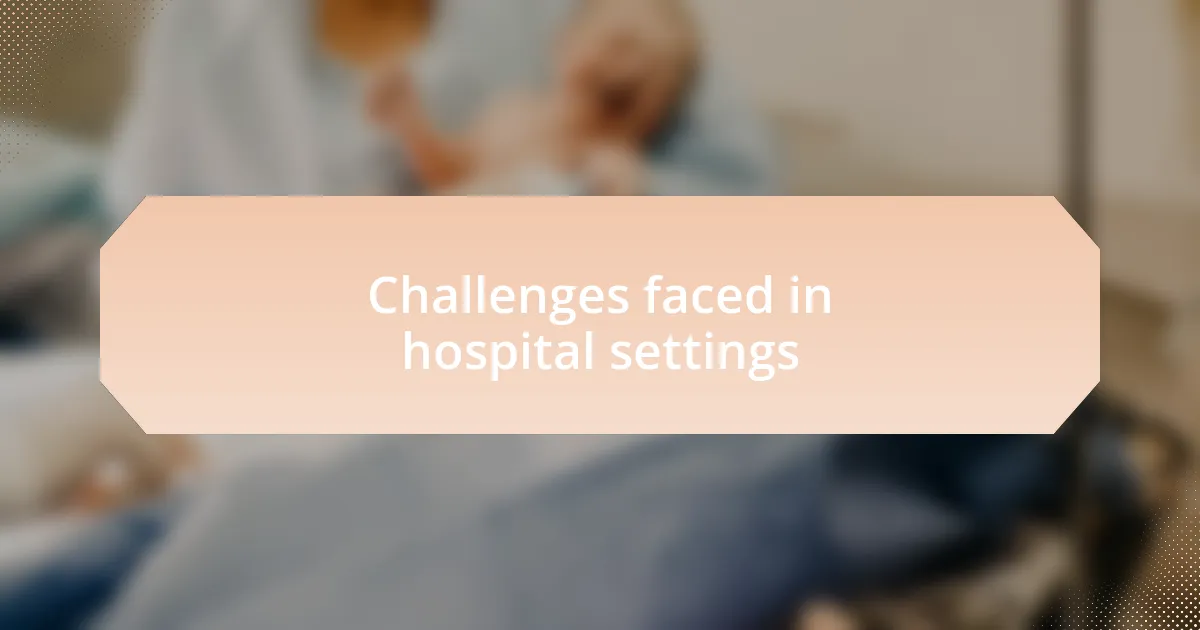
Challenges faced in hospital settings
In hospital settings, one significant challenge I often faced was the emotional toll of witnessing suffering and loss. I recall sitting with a family who had just received devastating news about their loved one’s prognosis. The weight of their grief was palpable, and I found myself reflecting on how crucial it is to provide not just spiritual guidance, but also a compassionate presence. Can you imagine trying to find the right words to comfort someone in those moments?
Another challenge relates to navigating the complex dynamics of patient care. Hospitals often have multidisciplinary teams, and as a chaplain, I needed to collaborate with doctors, nurses, and social workers. I remember a particular instance where medical staff were pressed for time, and I had to advocate for a patient’s spiritual needs amidst the hustle. Balancing the urgency of medical care while ensuring that spiritual well-being isn’t overlooked can be a tightrope walk.
Moreover, the diversity of beliefs and backgrounds among patients presents its own hurdles. One evening, I found myself in a room with a patient whose faith was different from my own. It was an enlightening experience, as it taught me the importance of cultural sensitivity. How do we honor a patient’s beliefs while offering guidance? I discovered that genuinely listening and being open to understanding their perspective often leads to deeper connections.
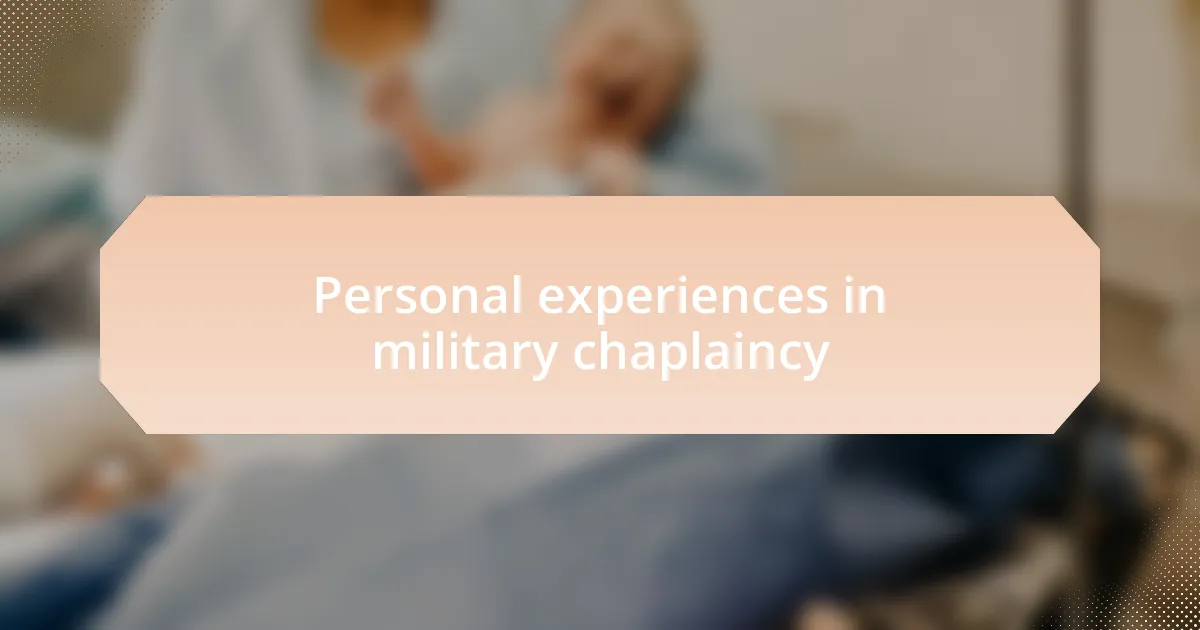
Personal experiences in military chaplaincy
During my time as a military chaplain, I discovered that the most profound connections often emerged in the quiet moments. I vividly recall sitting under the vast sky on a military base, with a soldier sharing his fears about deployment. It struck me how the simple act of listening could provide a refuge from the chaos of his world. Have you ever pondered how vital a listening ear can be in moments of uncertainty?
One night, I was called to lead a memorial service for a fallen comrade. The air was thick with grief and disbelief, and as I spoke, I could see tears welling in the eyes of the crowd. In those vulnerable moments, I felt a deep responsibility to honor not just the person’s life, but also the shared bond of service among us. How do you articulate the weight of loss when words seem utterly inadequate? That experience taught me that sometimes presence and silence can speak volumes.
I often encountered diverse beliefs within the ranks, each with its own unique expression of faith. I remember meeting a fellow chaplain from a different religious tradition. We often collaborated on interfaith services, and through those experiences, I learned the richness that comes from embracing different perspectives. It made me reflect: how can our differences truly unite us in times of crisis? These interactions expanded my understanding and allowed me to serve as a bridge for others looking for solace in challenging times.
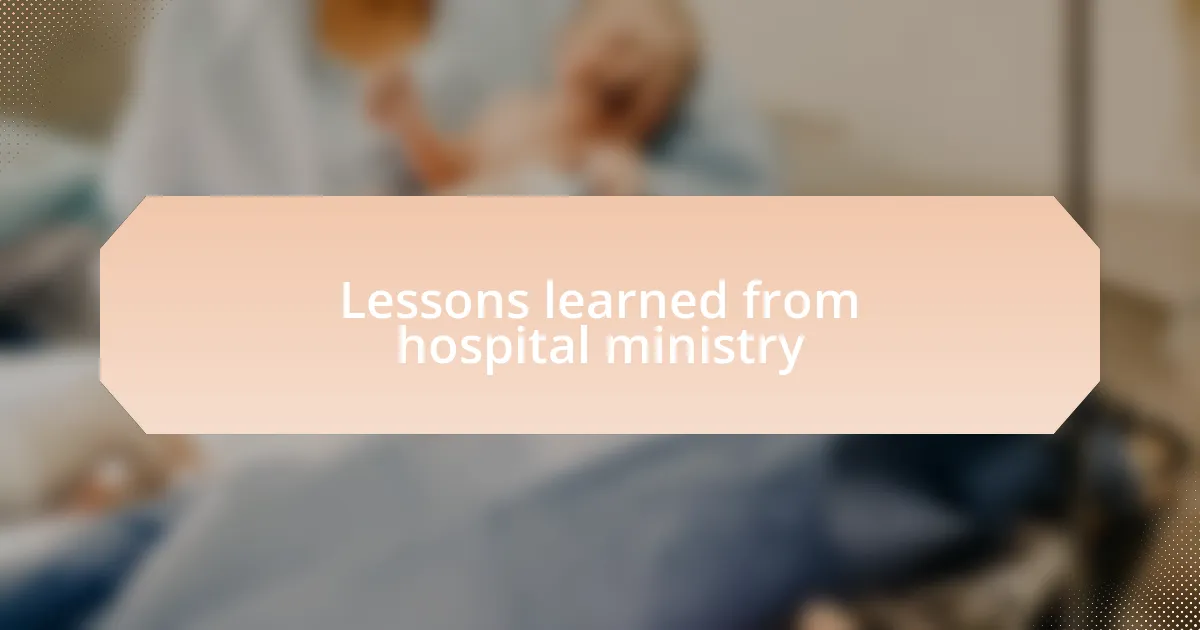
Lessons learned from hospital ministry
In my experience within hospital ministry, I’ve learned that empathy is a powerful tool. One instance that stands out involved visiting a soldier recovering from severe injuries. The room was filled with an overwhelming sense of fear and uncertainty. I remember holding his hand and, in that moment, I realized how crucial it is to create a space where individuals feel their pain is acknowledged. Have you ever considered the impact of simply being there for someone in distress?
Another valuable lesson came when I facilitated a prayer circle for the families awaiting news about their loved ones in surgery. I noticed how shared vulnerability could forge unexpected connections among them. It was incredible to witness how the act of praying together provided comfort—even if just for a moment. I often think: What if we recognized that our shared experiences, even the painful ones, can bring us closer together?
I also learned the importance of adaptability in ministry. During one particularly hectic week, I was invited to provide spiritual support for a family facing a terminal diagnosis. I approached it with sensitivity, but honestly, I felt overwhelmed. Yet, I quickly adapted my approach to focus on their needs, rather than adhering strictly to my usual practices. This taught me that being flexible not only deepens trust but also opens doors to more genuine conversations. How often do we allow ourselves to adjust our plans to meet others where they are?
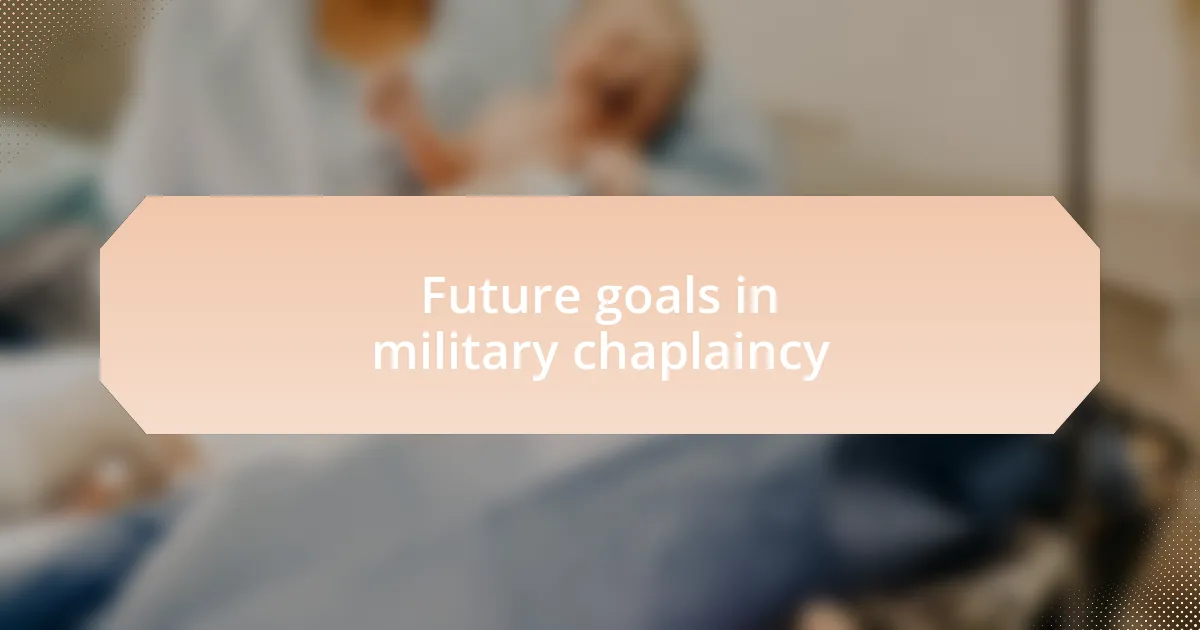
Future goals in military chaplaincy
As I look ahead in my military chaplaincy journey, one of my primary goals is to enhance mental health resources for service members. In my experience, many soldiers face mental health challenges but often hesitate to seek help due to stigma. I remember talking to a veteran who expressed feeling isolated, even in a room full of people. It made me wonder: how can I create an environment where seeking help is seen as a sign of strength, not weakness?
Another goal is to deepen my engagement with families of deployed service members. I recall a time when a spouse reached out to me during deployment, feeling the weight of uncertainty and fear. It struck me how vital it is to provide support not just to the service member but also to their loved ones. What if chaplains could be a bridge, connecting families with resources and emotional support during these challenging periods?
Lastly, I aim to foster interfaith dialogue within the military community. I had a profound experience when I collaborated with chaplains from different faith traditions during a memorial service. The unity we built amidst our diversity was incredibly moving. How can we continue to promote understanding and respect in an environment where differences are often highlighted? আমার দৃঢ় বিশ্বাস যে, শান্তির সন্ধান এবং মানবিক সম্পর্ক গড়ে তোলার জন্য একত্রিত হওয়া গুরুত্বপূর্ণ।